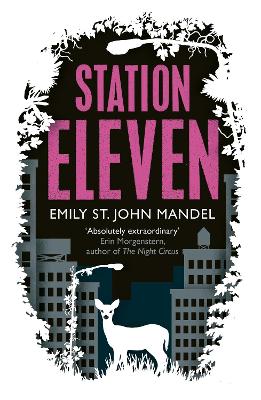
laughingrachel
Written on Apr 13, 2017

Bookhype may earn a small commission from qualifying purchases. Full disclosure.
Shortlisted for the 2014 National Book Awards Observer Thriller of the Month DAY ONE The Georgia Flu explodes over the surface of the earth like a neutron bomb. News reports put the mortality rate at over 99%. WEEK TWO Civilization has crumbled. YEAR TWENTY A band of actors and musicians called the Travelling Symphony move through their territories performing concerts and Shakespeare to the settlements that have grown up there. Twenty years after the pandemic, life feels relatively safe. But now a new danger looms, and he threatens the hopeful world every survivor has tried to rebuild. STATION ELEVEN Moving backwards and forwards in time, from the glittering years just before the collapse to the strange and altered world that exists twenty years after, Station Eleven charts the unexpected twists of fate that connect six people: famous actor Arthur Leander; Jeevan - warned about the flu just in time; Arthur's first wife Miranda; Arthur's oldest friend Clark; Kirsten, a young actress with the Travelling Symphony; and the mysterious and self-proclaimed 'prophet'. Thrilling, unique and deeply moving, Emily St.
John Mandel's Station Eleven is a beautiful novel that asks questions about art and fame and about the relationships that sustain us through anything - even the end of the world.


Kirsten and August walked mostly in silence. A deer crossed the road ahead and paused to look at them before it vanished into the trees. The beauty of this world where almost everyone was gone. If hell is other people, what is a world with almost no people in it? Perhaps humanity would simply flicker out, but Kirsten found this thought more peaceful than sad. So many species had appeared and then later vanished from this earth; what was one more? How many people were left even now?
On silent afternoons in his brother’s apartment, Jeevan found himself thinking about how human the city is, how human everything is. We bemoaned the impersonality of the modern world, but that was a lie, it seemed to him; it had never been impersonal at all. There had always been a massive delicate infrastructure of people, all of them working unnoticed around us, and when people stop going to work, the entire operation grinds to a halt. No one delivers fuel to the gas stations or the airports. Cars are stranded. Airplanes cannot fly. Trucks remain at their points of origin. Food never reaches the cities; grocery stores close. Businesses are locked and then looted. No one comes to work at the power plants or the substations, no one removes fallen trees from electrical lines. Jeevan was standing by the window when the lights went out.
There was a stupid moment or two when he stood near the front door, flipping the light switches. On/off, on/off.
“Stop it,” Frank said. “You’re driving me crazy.”







